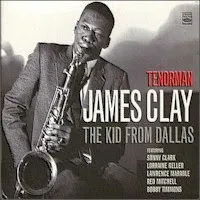Styles: Saxophone Jazz
Year: 2008
File: MP3@320K/s
Time: 74:53
Size: 171,7 MB
Art: Front
(10:28) 1. NY-TLV-NY
(11:08) 2. Every Time We Say Goodbye
(10:41) 3. Gypsy
(13:30) 4. Pum-Pum
( 8:47) 5. I Fall in Love Too Easily
(11:36) 6. Shoohoo
( 8:41) 7. Colin's Dream
Live at Louis 649
Year: 2008
File: MP3@320K/s
Time: 74:53
Size: 171,7 MB
Art: Front
(10:28) 1. NY-TLV-NY
(11:08) 2. Every Time We Say Goodbye
(10:41) 3. Gypsy
(13:30) 4. Pum-Pum
( 8:47) 5. I Fall in Love Too Easily
(11:36) 6. Shoohoo
( 8:41) 7. Colin's Dream
Over the years, the phrases "organ/tenor group," "tenor/organ group," and "organ/sax combo" have often been synonymous with soul-jazz. When soul-jazz fans hear the words "organ" and "tenor" in the same sentence, they immediately think of all things funky; they immediately think of Stanley Turrentine's work with Shirley Scott or Gene Ammons' encounters with Jack McDuff and Johnny "Hammond" Smith. But one shouldn't forget about the post-bop innovations of Larry Young, who moved organ groups beyond soul-jazz and paved the way for everyone from Barbara Dennerlein to John Medeski. And on this live album, one hears a tenor/organ trio that has nothing to do with soul-jazz and everything to do with post-bop. The tenor saxophonist is Eli Degibri (who is also heard on soprano sax) and the organist is Gary Versace; rounding out the threesome is drummer Obed Calvaire. This 74-minute CD was recorded in August 2007 at Louis 649, a small club in Lower Manhattan's Alphabet City section (which was notoriously dangerous in the 1970s and 1980s but became quite gentrified during New York City's Rudy Giuliani/Michael Bloomberg era). Degibri could have easily embraced a sax/bass/drums format at Louis 649 but the fact that he went the organ route instead was a good thing, because this release is a worthwhile example of a post-Jimmy Smith approach to tenor/organ jazz. The trio's performances are hardly groundbreaking by 2007 standards; Young's groups were doing this type of thing 40 years earlier. But the performances are solid, albeit derivative, on the Tin Pan Alley warhorses "I Fall in Love Too Easily" and "Every Time We Say Goodbye" as well as Degibri originals that include "Shoohoo," "Colin's Dream," and the moody "Gypsy." Although not a five-star masterpiece, Live at Louis 649 is a respectable document of Degibri's sax/organ encounters in downtown Manhattan. ~ Alex Henderson http://www.allmusic.com/album/live-at-louis-649-mw0000794666
Personnel: Eli Degibri (saxophone); Gary Versace (organ, Hammond b-3 organ); Obed Calvaire (drums).
Personnel: Eli Degibri (saxophone); Gary Versace (organ, Hammond b-3 organ); Obed Calvaire (drums).
Live at Louis 649




















